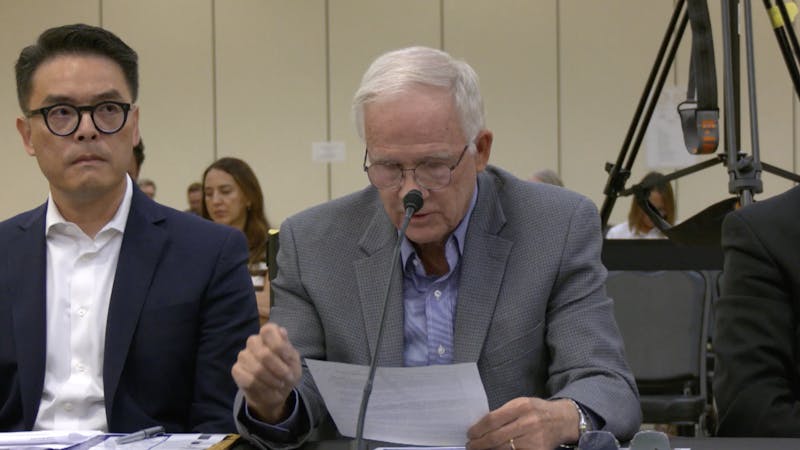Honor Council changes call for deliberation
Editor's note: This article has been changed from its original version:Along with Willy's Statue and Wayne Graham's stare, the Honor Code is an integral member of Rice's identity. Long a member of the Rice culture, the Honor Code's merits have been ingrained into Rice's bones, holding students to the highest ethical standards that a university of our stature can.
But while the Honor Code has not seen change in years, the Honor Council, the governing body entrusted to uphold the code, looks set for reform. Professor Evan Siemann's recent survey, while small in number, suggests that the majority of students and faculty want to see change brought about in both the Honor Council's form and function (see story, page 7).
Since the Faculty Senate tabled the discussion for its next meeting, we won't hear its decision - which, we would remind you, has no technical bearing on the Honor Council's possible restructuring - for some time. As such, we would like to offer our suggestions to the Faculty Senate.
Firstly, the survey has shown that faculty and students would like to see the Honor Council, similar to other like-minded institutions, split into graduate and undergraduate sections. These new sections, cleaved by standing, would then hear the grievances brought forth against their respective peers. But just because other institutions on par with Rice do something does not accordingly mean that we should follow suit. We should be held to the standards inherent to Rice, not those of Princeton, nor those of William & Mary, nor those of Virginia.
That being said, the parsing of the Honor Council may be a viable option to alleviating the burden placed on a slow, overburdened system. It is a shame that it must take months for certain cases to be heard, but with the heft of dozens of hearings brought forth every year it is inevitable that the process would reach this snail's pace.
Furthermore, as it stands, the population of graduate students represented on the Honor Council is disproportionately small. Because the Honor Council is undergraduate-heavy, there is the possibility that the differences between graduate and undergraduate curriculum will not be properly taken into account. It doesn't matter if it results in more innocent cases or more guilty pleas - because there is a discretion, there is a problem.
The only concern that would arise from a split Honor Council is that of a different standard, a method by which each council views similar cases in a different light. The Honor Code is universal within the hedges - its makeup cannot be up for debate. Fortunately, there is nothing to suggest that the two proposed Honor Councils would shift their modes of thinking in any drastic fashion.
The second finding of Siemann's survey is that the majority of Rice's faculty and student populations would not mind discussing schoolwork ethics independently. Over half of the polled faculty members would approve of handling problems of collaboration, plagiarism and exceeding time limits without the Honor Council's involvement.
This is a far thornier issue than the first point. Not only could professors hold students to different standards, but the students, without going in front of the Honor Council to plead their case, are already convicted of guilt. Of course, there's the flip side - the professor could believe that the Honor Council's possible punishments would be far stricter than the actions warrant, in which case the professor would take matters into his or her own hands and the Honor Code would be left by the wayside.
There also remains the question of whether or not the amorous relations policy, enacted last year, will be brought into play ("Amorous relations revisited," May 15). Just because this is Rice does not preclude students from striving for the best grades - in fact, it is possible that the strenuous, nerve-racking drive for better grades may propel certain facets of the Rice population to further and sexier means of success.
There is no simple solution to this matter. Needless to say, instances already arise in which the professors and students come to a consensus outside of the Honor Council. However, we cannot advocate the recommendation of Siemann's findings. Just because professors don't want to wait a few months for the Honor Council to reach its findings does not mean they should take matters into their own judgment.
After all, no professors are meddling with Wayne Graham's piercing gaze - why should they interfere with the Honor Code?
More from The Rice Thresher

Rice announces Chao College as 12th residential college
Rice announced that the 12th residential college will be named Ting Tsung and Wei Fong Chao College Aug. 19. The college, set to open in fall 2026, will contain nearly 300 on-campus beds.
Dining access fund announced following on-campus unlimited meal swipes
Rice announced new food assistance programs on Tuesday to account for the controversial change in the on-campus meal swipe plan.

Rice disaster prediction model discussed at hearing on deadly Central Texas floods
The House and Senate Select Committees on Disaster Preparedness and Flooding held a hearing on July 31 in Kerrville to address the deadly July 4 flooding in Central Texas. The flooding along the banks of the Guadalupe River killed 108 people, including 37 children. In the charged hearing, Texas lawmakers and flood survivors criticized the local response to the disaster.


Please note All comments are eligible for publication by The Rice Thresher.